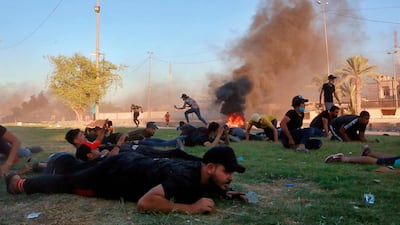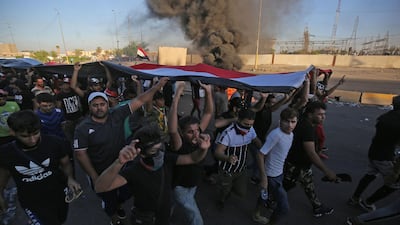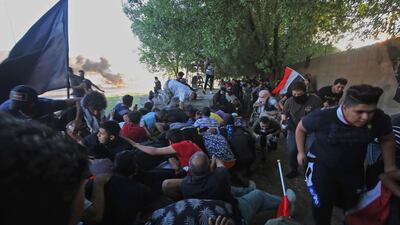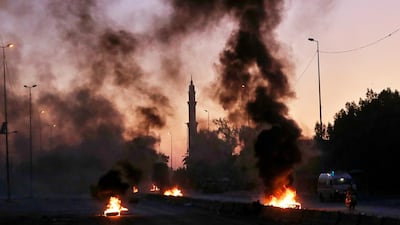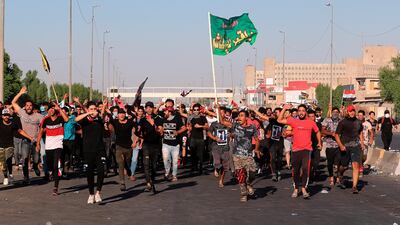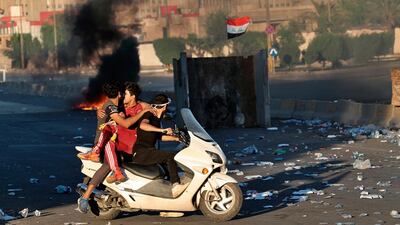The Iraqi government has lifted the daytime curfew imposed on Baghdad after days of deadly protests left at least 94 people dead.
Authorities have left roads leading to major squares in the Iraqi capital blocked because of fears that citizens would once again mobilise.
The death toll from mass protests in Baghdad and cities across southern Iraq rose to nearly 100 as the unrest entered its fifth day, parliament's human rights commission said.
Nearly 4,000 people have also been wounded since the protests against chronic unemployment, poor public services and widespread corruption erupted in the capital on Tuesday, the commission said.
A total of 540 demonstrators have been arrested, of whom nearly 200 remain in custody, the panel added.
Protesters had defied the curfew, which was imposed on Thursday. The bloodiest violence in Baghdad came Friday, when 22 people were killed. Health officials said many of the victims’ wounds were in the head and chest.
Prime Minister Adel Abdel Mahdi ordered the curfew in the capital lifted from 5am (0200 GMT) on Saturday, although an internet blackout remained in force.
The protests over unfair distribution of jobs, lack of services and government corruption erupted on Tuesday in Baghdad and quickly spread to other Iraqi cities, mainly in the south.
The security forces have accused gunmen of hiding among demonstrators to shoot at police. Several policeman have died.
Masked gunmen attacked the offices of several television stations in the Iraqi capital on Saturday evening, The Associated Press reported.
Broadcaster Al-Arabiya said the gunmen arrived in black cars wearing black clothes and stormed the offices of the television station, attacking employees and smashing equipment before fleeing the scene. The channel's Baghdad correspondent said several colleagues were injured.
Gunmen also attacked employees at Iraq's Dajla and NRT news channels in Baghdad.
On Saturday, Iraqi officials and a member of the semi-official human rights commission said thousands had have taken to the streets in the southern cities of Nasiriyah and Diwaniyah. In Nassiriyah the offices of two political parties were set ablaze and security forces responded with fire, but there was no immediate word on casualties. In Diwaniyah, protesters marched toward local government offices. There were no reports of violence there.
On Saturday evening, a senior UN official in Iraq called for calm, denouncing the violence of the last few days.
"Five days of reported deaths and injuries; this must stop," Jeanine Hennis-Plasschaert, the special representative of the UN secretary general in Iraq, said in a Twitter post.
"Those responsible for violence should be held to account," she added.
The recent turmoil is the deadliest unrest Iraq has seen since the declared defeat of ISIS in 2017 and has shaken the year-old government of Prime Minister Adel Abdul Mahdi.
The government has responded with vague reform promises that are unlikely to placate Iraqis.
On Friday, influential Shiite cleric Moqtada Al Sadr called on the government to resign as violence spiked.
The former Shiite militia leader, whose bloc is the biggest in parliament, said in a statement that in order to avoid further deaths "the government should resign and early elections should be held under UN supervision".
He said he could "not keep silent" as Iraqi blood was being shed.
Mr Al Sadr's statement piled new pressure on the prime minister as he battles to quell the unrest.
It came after Shiite spiritual leader Grand Ayatollah Ali Sistani urged authorities in a midday sermon to heed the demands of demonstrators, warning the protests could escalate unless immediate and clear steps are taken.
